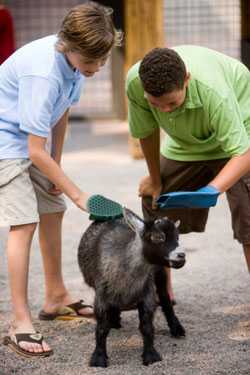Domestic Activities
 Many of CDC’s activities use a One Health approach to better understand the links between human, animal, and environmental health. In addition to supporting One Health activities around the world, CDC is involved in One Heath work in the United States.
Many of CDC’s activities use a One Health approach to better understand the links between human, animal, and environmental health. In addition to supporting One Health activities around the world, CDC is involved in One Heath work in the United States.
Zoonoses Education Coalition
Pets are a wonderful part of our lives. Safe and responsible pet ownership is important to keep both people and pets healthy and happy. Some diseases, called zoonoses, can spread between people and animals. It is important for people with pets to know about zoonoses and how to prevent them so they can enjoy their pets without getting sick.
The Zoonoses Education Coalition (ZEC) was formed to develop a set of evidence-based, plain language recommendations, which can be used by everyone involved in promoting healthy pets and healthy people. The ZEC is a group of dedicated partners including representatives from the Pet Industry Joint Advisory Council (PIJAC), the pet industry, including breeders and retailers, the National Association of State Public Health Veterinarians (NASPHV), the American Veterinary Medical Association (AVMA), the United States Department of Agriculture (USDA), the Food and Drug Administration (FDA), the Centers for Disease Control and Prevention, and others. To this day, this partnership between the public and private sector has resulted in scientifically based prevention messages to educate pet owners and other stakeholders on how to stay healthy while enjoying their pets.
Messages developed by the ZEC follow:
- Safe handling of reptiles (turtles, snakes, lizards) and amphibians (frogs, toads)
- “Healthy Herp Handling [PDF – 1 page]” poster created to inform pet owners about safe-handling of pet reptiles and amphibians.
- Safe handling of pet rodents (hamsters, gerbils, mice, and rats)
- Safe handling of feeder rodents, including live and frozen
National Association of State Public Health Veterinarians
CDC works closely with the National Association of State Public Health Veterinarians (NASPHV). State public health veterinarians are the local and state professionals who regularly consult with physicians, emergency rooms, legislators, local officials, schools, health departments, and the general public on preventing and controlling diseases that people can get from animals and animal products. NASPHV, in partnership with CDC and others, collaborate on a variety of guidance and recommendations related to the prevention and control of zoonoses.
CDC Partnership on Youth Zoonoses Prevention
 CDC, the United States Department of Agriculture (USDA), and the 4-H Public Health Youth Education Program have an ongoing partnership to educate youth on the transmission and prevention of zoonoses.
CDC, the United States Department of Agriculture (USDA), and the 4-H Public Health Youth Education Program have an ongoing partnership to educate youth on the transmission and prevention of zoonoses.
Objectives of this One Health partnership include:
- Teach youth, leaders, and parents about zoonotic disease transmission and prevention.
- Teach youth how to reduce their risk of getting a zoonotic disease.
- Encourage youth to share their new knowledge about zoonotic diseases with their communities.
- Teach youth how to help detect zoonotic diseases to help limit the impact of these diseases on individuals and their communities.
- Create lasting relationships between youth, their families, and public health agencies.
- Create a sustainable partnership between federal and non-federal partners to address public health issues that relate to youth and animal contact.
- Decrease the number of illnesses and deaths associated with zoonotic diseases in the United States.
- Develop relationships among human and animal health partners that could be used to facilitate more effective and efficient responses to important human and animal health issues such as outbreaks of zoonotic influenza viruses.
To help empower millions of youth, CDC and partners are developing materials to educate people about ways to prevent zoonotic diseases. Organizations from multiple states, including state public health departments, animal health departments, and 4-H programs, are assisting in the creation of these educational materials.
Current products include:
- A student magazine, “Be a Zoonotic Disease Detective,” created by Georgia 4-H and accompanying lesson plans about zoonotic diseases that can be customized for use in any jurisdiction
- 4-H Animal Science Anywhere: Diseases That Animals and Humans Share: The Words You Need to Know
Research
 CDC scientists study how diseases in animals become threats to human health in the United States and around the world. They also look at how changes in the environment affect the health of animals and humans. Their research helps us understand:
CDC scientists study how diseases in animals become threats to human health in the United States and around the world. They also look at how changes in the environment affect the health of animals and humans. Their research helps us understand:
- How viruses, bacteria, and parasites spread between animals and humans.
- How a person’s behavior can increase the risk that they will get sick from an animal.
- How quickly these diseases can spread.
Collaboration and Partnerships
Across the United States, CDC works with local and state agencies as well as animal, environmental, and human health partners.
- Page last reviewed: January 25, 2017
- Page last updated: January 25, 2017
- Content source:


 ShareCompartir
ShareCompartir